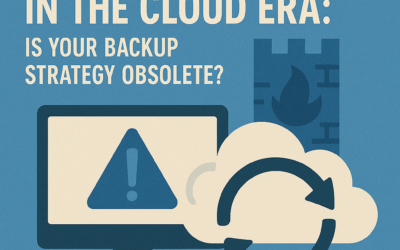In the fast-paced, technology-driven world we inhabit, managed IT cloud services have become an indispensable component of modern business. No longer a peripheral function, IT has evolved into the cornerstone of successful operations, propelling efficiency, innovation, and growth. It empowers businesses to navigate the complexities of the marketplace, deliver exceptional customer experiences, and outpace competitors. As we explore this dynamic relationship, we will uncover how IT is reshaping industries and unlocking new opportunities for organizations.

What are Cloud Managed IT Services?
Cloud-managed IT services entail outsourcing the management and upkeep of a company’s cloud infrastructure to a third-party provider. This encompasses tasks like cloud migration, setup and security, and performance optimization. These services are becoming increasingly vital for businesses as they offer cost savings, scalability, expert management, a focus on core business activities, and enhanced security. By delegating IT management, companies can concentrate on growth and innovation while benefiting from the cloud’s potential.
Features of Cloud-Managed IT Services
Cloud-managed IT services offer a range of advantages that make them indispensable for modern businesses.
- Scalability: allows businesses to effortlessly expand or contract their IT resources to align with fluctuating demands.
- Flexibility: enables organizations to adapt to changing market conditions and business requirements with agility.
- Security: Implements robust measures to protect sensitive data and mitigate cyber threats, providing businesses with peace of mind.
Managed cloud IT services & security
Cloud-managed IT services prioritize data security through a multi-layered approach. These services employ advanced security measures like firewalls, intrusion detection systems, and encryption to safeguard sensitive information. Regular security audits and vulnerability assessments are conducted to identify and address potential threats proactively.
Moreover, cloud providers offer continuous monitoring of systems and networks to detect anomalies and suspicious activities. Real-time alerts and incident response plans ensure swift action in case of security breaches. This proactive approach to security helps businesses protect their valuable data and maintain compliance with industry regulations.
Managed Cloud IT Services & Cost Saving Benefits
Traditional IT setups require significant upfront investments in hardware, software, and data centers. These assets incur ongoing expenses for maintenance, upgrades, and energy consumption. In contrast, cloud-based services operate on a pay-per-use model, allowing businesses to scale resources up or down as needed. By eliminating the need for physical servers, storage devices, networking equipment and organizations can avoid hefty capital expenditures and reduce ongoing maintenance costs. Additionally, cloud providers handle infrastructure management, freeing up internal IT resources to focus on strategic initiatives. This combination of factors translates into substantial cost savings for businesses of all sizes.
Businesses can rapidly adjust their IT infrastructure to accommodate fluctuations in workload, seasonal demands, or unexpected growth spurts. Whether it is increasing computing power for a major project or reducing server capacity during slower periods, cloud services provide the flexibility to optimize resource utilization and minimize costs. This agility empowers organizations to respond quickly to market changes and seize new opportunities.
Managed Cloud IT Services — Performance and Uptime
Managed cloud IT services prioritize delivering exceptional performance and maximum uptime. To achieve this, providers employ advanced technologies and robust infrastructure.
- Redundancy: Multiple data centers and servers work in tandem to prevent service disruptions. This ensures that even if one system fails, others can seamlessly take over, minimizing downtime.
- Continuous Performance Monitoring and Optimization: By closely tracking system performance metrics, providers can identify potential bottlenecks and proactively address them. This includes load balancing, resource allocation, and capacity planning to ensure optimal performance under varying conditions.
- Regular System Updates and Patches: These measures collectively contribute to a reliable and high-performing cloud environment, enabling businesses to operate without interruptions and deliver exceptional customer experiences.
Services That Can Be Customized and Easily Integrated with Existing Systems

Organizations require IT solutions that are adaptable to their unique needs and can seamlessly work with their existing systems. This need arises from several factors:
- Unique Business Requirements: Customizable services allow businesses to tailor solutions to match their exact needs, maximizing efficiency and productivity.
- Legacy Systems: Integrable services ensure that new solutions can coexist and collaborate with legacy systems, avoiding costly overhauls.
- Efficiency and Productivity: Seamless integration between different systems eliminates data redundancy, reduces manual tasks, and streamlines operations. This leads to improved efficiency and increased productivity.
- Scalability: Customizable and integrable services can adapt to these changes without requiring significant reengineering.
- Competitive Advantage: By leveraging tailored and integrated solutions, organizations can gain a competitive edge by optimizing processes, improving customer experiences, and making data-driven decisions.
24/7 Support & Regular Maintenance
24/7 support and regular maintenance are essential for ensuring uninterrupted business operations and optimal system performance. Around-the-clock support guarantees prompt assistance for critical issues, minimizing downtime and potential revenue loss. Regular maintenance proactively identifies and resolves problems, enhances system efficiency, and protects against security threats. Together, these services safeguard business continuity, optimize IT investments, and contribute to overall business success.
The Future Is in the Clouds
The market for managed cloud IT services is poised for substantial growth in the coming years. Driven by increasing digital transformation, the need for scalability, cost efficiency, and enhanced security is propelling businesses towards cloud adoption. Emerging technologies like artificial intelligence, machine learning, and the Internet of Things will further fuel demand for specialized managed cloud services. As enterprises recognize the value of outsourcing IT management to focus on core competencies, the adoption of managed cloud IT services is expected to accelerate across various industries and geographies.
Managed cloud IT services offer a multitude of benefits, including cost reduction, scalability, enhanced security, and improved performance. By outsourcing IT management, businesses can focus on core competencies while benefiting from expert support and continuous monitoring. The ability to customize and integrate cloud services with existing systems further enhances their value. As the digital landscape evolves, adopting managed cloud IT services becomes imperative for organizations seeking to maintain competitiveness, agility, and efficiency. Embracing this technology is no longer an option but a necessity for thriving in today’s fast-paced business environment.




